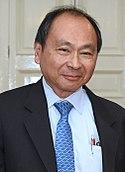Francis Fukuyama Quote
The present historical account of the origins of political institutions needs to be seen in proper perspective. No one should expect that a contemporary developing country has to replicate all of the violent steps taken by China or by societies in Europe to build a modern state, or that a modern rule of law needs to be based in religion. We have seen how institutions were the products of contingent historical circumstances and accidents that are unlikely to be duplicated by other differently situated societies. The very contingency of their origins, and the prolonged historical struggles that were required to put them in place, should imbue us with a certain degree of humility in approaching the task of institution building in the contemporary world. Modern institutions cannot simply be transferred to other societies without reference to existing rules and the political forces supporting them. Building an institution is not like building a hydroelectric dam or a road network. It requires a great deal of hard work to persuade people that institutional change is needed in the first place, build a coalition in favor of change that can overcome the resistance of existing stakeholders in the old system, and then condition people to accept the new set of behaviors as routine and expected. Oftentimes formal institutions need to be supplemented by cultural shifts; electoral democracy won’t work well, for example, if there isn’t an independent press and a self-organizing civil society to keep governments honest.
The present historical account of the origins of political institutions needs to be seen in proper perspective. No one should expect that a contemporary developing country has to replicate all of the violent steps taken by China or by societies in Europe to build a modern state, or that a modern rule of law needs to be based in religion. We have seen how institutions were the products of contingent historical circumstances and accidents that are unlikely to be duplicated by other differently situated societies. The very contingency of their origins, and the prolonged historical struggles that were required to put them in place, should imbue us with a certain degree of humility in approaching the task of institution building in the contemporary world. Modern institutions cannot simply be transferred to other societies without reference to existing rules and the political forces supporting them. Building an institution is not like building a hydroelectric dam or a road network. It requires a great deal of hard work to persuade people that institutional change is needed in the first place, build a coalition in favor of change that can overcome the resistance of existing stakeholders in the old system, and then condition people to accept the new set of behaviors as routine and expected. Oftentimes formal institutions need to be supplemented by cultural shifts; electoral democracy won’t work well, for example, if there isn’t an independent press and a self-organizing civil society to keep governments honest.
Related Quotes
About Francis Fukuyama
Fukuyama is best known for his book The End of History and the Last Man (1992), which argues that the worldwide spread of liberal democracies and free-market capitalism of the West and its lifestyle may signal the end point of humanity's sociocultural evolution and political struggle and become the final form of human government, an assessment met with numerous and substantial criticisms. In his subsequent book Trust: Social Virtues and Creation of Prosperity (1995), he modified his earlier position to acknowledge that culture cannot be cleanly separated from economics. Fukuyama is also associated with the rise of the neoconservative movement, from which he has since distanced himself.
Fukuyama has been a senior fellow at the Freeman Spogli Institute for International Studies since July 2010 and the Mosbacher Director of the Center on Democracy, Development and the Rule of Law at Stanford University. In August 2019, he was named director of the Ford Dorsey Master's in International Policy at Stanford.
Before that, he served as a professor and director of the International Development program at the School of Advanced International Studies of Johns Hopkins University. Previously, he was Omer L. and Nancy Hirst Professor of Public Policy at the School of Public Policy at George Mason University.
He is a council member of the International Forum for Democratic Studies founded by the National Endowment for Democracy and was a member of the Political Science Department of the RAND Corporation. He is also one of the 25 leading figures on the Information and Democracy Commission launched by Reporters Without Borders. In 2024 he received the Riggs Award for Lifetime Achievement in International and Comparative Public Administration.
